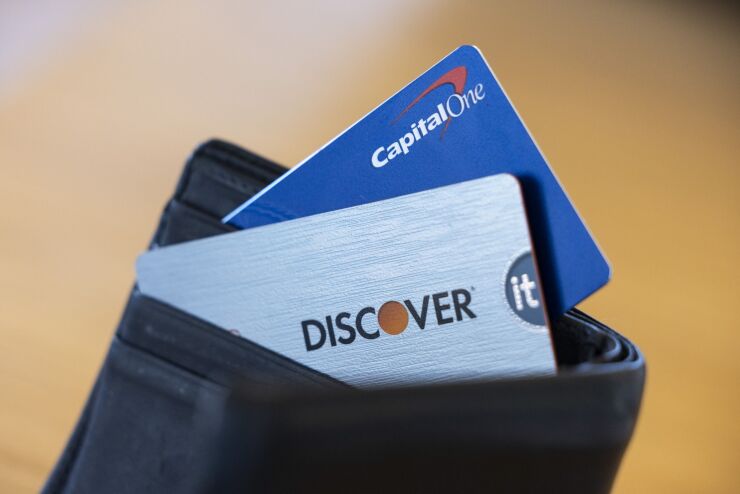
Capital One Financial says it's talking to community groups about developing a community benefits plan that would accompany its
Capital One is "proactively meeting" with organizations to gather feedback that would help with the creation of such a plan, the McLean, Virginia, company disclosed in
Capital One did not disclose the names of specific community groups with which it is engaging. But the bank said in its merger application that its 27-member Community Advisory Council has helped it to better understand the financial needs of underserved consumers.
Current members of the company's Community Advisory Council include the National Coalition of Asian Pacific American Community Development, the National Association of Latino Community Asset Builders and the Local Initiatives Support Corporation.
One group that is not active in discussions with Capital One is the National Community Reinvestment Coalition, a fair-lending advocacy group that has negotiated 21 community benefits plans with banks since 2016, according to its website.
The NCRC, which has more than 700 member organizations, opposes Capital One's pending acquisition of Discover, arguing that much of Capital One's business model takes advantage of lower-income credit card holders, and that the deal would diminish competition.
A source familiar with Capital One's thinking said that the company is not closing doors on the involvement of any community groups. This source also said that Capital One plans to move quickly to develop a community benefits plan after the public comment period on the proposed merger ends.
Community benefits plans have become commonplace in connection with acquisitions as banks seek to outline to regulators how their deals will satisfy Community Reinvestment Act requirements.
Such agreements often include pledges to expand banking services in low- and moderate-income areas. The commitments typically fall in three buckets — community development lending and investments; affordable housing and residential mortgage lending; and philanthropic dollars.
In connection with Capital One's 2011 acquisition of ING Direct USA, the bank agreed to a plan that included a community lending pledge of $180 billion over 10 years. Despite this pledge, the Capital One-ING Direct transaction still
On Monday, NCRC President and CEO President Jesse Van Tol said in an email that Capital One's pledge related to the ING Direct acquisition was "largely a commitment to do the same level of subprime credit card and auto lending as they were already doing." He said one part of the commitment — related to mortgages — wasn't fulfilled because Capital One exited the residential mortgage business.
"We don't need to speculate about what a Capital One community benefits agreement would look like," Van Tol said in the email. "Nobody should believe a Capital One-developed commitment."
Andy Navarrete, Capital One's head of external affairs, said in a written statement that the company has a "proud history of serving the full spectrum of American consumers and of outstanding Community Reinvestment Act performance.
"Through the creation of our Community Advisory Council in 2013, as well as our deep relationships with over 1,000 non-profit partners, we work every day to develop innovative ways to best serve our communities and customers, including being the first large bank to completely eliminate overdraft fees in 2021," Navarrete said.
"As noted in our application, we are in the process of seeking input as we develop our community benefit plan, and we welcome the opportunity to work with any individual or organization that shares our commitment to investment in communities," he added.
In its merger application, Capital One noted that it received an "outstanding" rating on its most recent Community Reinvestment Act performance evaluation in 2020 — the second consecutive evaluation where it got the highest possible rating.
Discover's banking unit received "outstanding" ratings in its 2016, 2018 and 2020 performance evaluations before more recently being downgraded to "satisfactory" because of ongoing deficiencies in its student loan servicing business, Capital One said in its merger application.
Critics of community benefits plans point out that the agreements aren't codified, and thus banks don't have a legal obligation to fulfill the financial commitments they lay out. There have recently been renewed calls to hold banks accountable for what they promise.
Last week, the Federal Deposit Insurance Corp.
The FDIC's policy statement aims to force banks to show not only their past performance, but also how communities will be better off after an acquisition, according to Rohit Chopra, who is a member of the FDIC's board of directors as well as director of the Consumer Financial Protection Bureau.
The FDIC statement would mean that regulators stop "outsourcing their legal requirement to community organizations," and it would give those organizations "more confidence that the commitments made have some real teeth to them" and are "not just utter fakery," Chopra said at an event in Washington last week.
Chopra also alluded to confusion about
"We saw a number of community organizations ask some real big questions after the failure of Silicon Valley Bank," Chopra said.
In November, First Citizens BancShares, which acquired parts of Silicon Valley Bank after its collapse, updated the community benefits plan. It
Discussions about the FDIC's policy statement might help "to figure out how we can make some of this merger review actually lead to improvements rather than what I see as a hollowing out of a lot of services to a lot of low- to moderate-income people," Chopra said.






